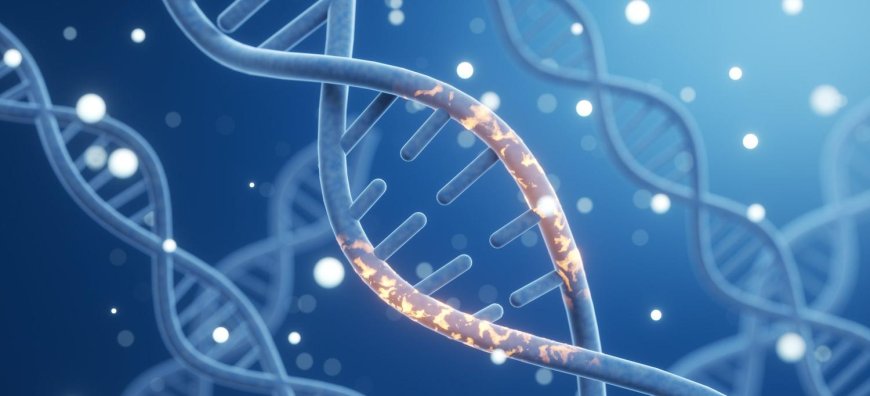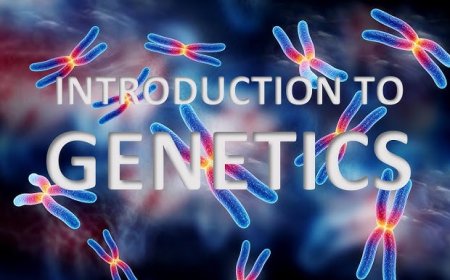Understanding Genetics: The Blueprint of Life
Explore the fascinating world of genetics, from DNA and heredity to Mendelian and non-Mendelian inheritance. Learn how genetic variation, mutations, and epigenetics shape traits, influence genetic disorders, and impact medicine, agriculture, and evolution."

What is Genetics?
Genetics is a branch of biology that studies genes, heredity, and the variation of organisms. It explains how traits are passed from parents to offspring, influencing characteristics such as eye color, height, and susceptibility to diseases. Genetics plays a foundational role in biology and has significant applications in medicine, agriculture, and evolutionary studies.
Chromosomes and Inheritance
At the core of genetics are chromosomes—structures within the cell nucleus that house genes. Humans inherit 23 pairs of chromosomes, with a unique combination of alleles from each parent. This genetic diversity contributes to the expression of traits and follows both Mendelian and non-Mendelian inheritance patterns.
Mendelian vs. Non-Mendelian Inheritance
- Mendelian Inheritance: Based on Gregor Mendel's principles, this type of inheritance follows predictable patterns dictated by dominant and recessive alleles.
- Non-Mendelian Inheritance: Includes complex patterns such as polygenic inheritance (multiple genes influencing a single trait) and pleiotropy (one gene affecting multiple traits).
Genetic Variation and Mutations
Genetic variation results from mutations—random changes in DNA caused by environmental factors or errors in DNA replication. These mutations contribute to diversity in traits and can sometimes lead to genetic disorders.
Multiple Alleles and Blood Types
Some traits are determined by multiple alleles. For example, human blood type is controlled by three alleles (A, B, and O), leading to four possible blood types: A, B, AB, and O.
Factors Influencing Inheritance
Genetic inheritance is influenced by a combination of genetic, environmental, and epigenetic factors.
Genetic Factors
- Gene and Allele Combinations: Each person inherits a unique set of alleles that determine their genotype and phenotype.
- Mutations: Changes in DNA sequences can be inherited or acquired, leading to new traits or genetic disorders.
Environmental Factors
- Gene-Environment Interactions: External factors like diet, toxins, and lifestyle can influence gene expression.
- Extranuclear Inheritance: Traits passed down through mitochondrial DNA, inherited maternally.
Epigenetics
Epigenetic modifications can alter gene activity without changing DNA sequences. These changes can be influenced by environmental factors and may be inherited across generations.
Applications of Genetic Inheritance
Genetics has a broad impact on multiple fields, including medicine, agriculture, and evolutionary biology.
Medicine and Genetic Disorders
Genetic disorders result from inherited mutations. Genetic testing and counseling help assess risks, while gene therapy offers potential treatments by correcting defective genes.
Agriculture and Animal Breeding
Understanding genetic inheritance allows for selective breeding in plants and animals to enhance desirable traits like disease resistance and higher yields.
Evolutionary Biology
Genetics explains how species evolve over time through the accumulation of genetic variations, leading to speciation.
Historical Context of Genetics
The study of genetics dates back to ancient civilizations, but Gregor Mendel’s 19th-century experiments with pea plants laid the foundation for modern genetics. His principles of inheritance were rediscovered in 1900, marking the formal beginning of genetic science.
Public Perception and Ethical Considerations
Genetics raises ethical concerns, particularly regarding genetic discrimination, privacy, and the impact of genetic testing.
Genetic Discrimination
There are concerns about the misuse of genetic information in employment and healthcare. Laws like the Genetic Information Nondiscrimination Act (GINA) aim to prevent such discrimination.
Ethical Implications of Genetic Testing
While genetic testing provides valuable health insights, it also raises concerns about privacy, consent, and the psychological effects of knowing one’s genetic risks.
Role of Education and Media Representation
Education and responsible media coverage play a crucial role in shaping public understanding of genetics, helping to address misconceptions and ethical concerns.
Conclusion
Genetics is a rapidly evolving field with profound implications for medicine, agriculture, and our understanding of life itself. As scientific advancements continue, ethical considerations and public education will be key to navigating its future responsibly.










































